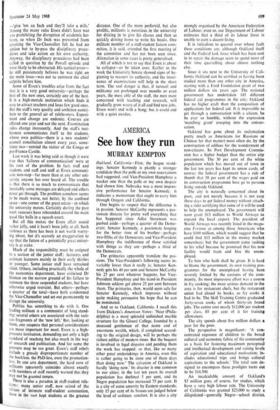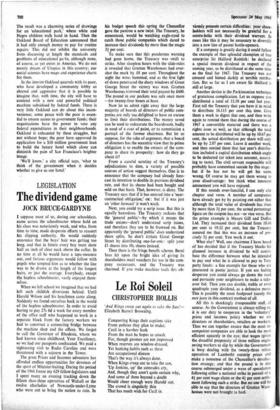See how they run
AMERICA MURRAY KEMPTON
Oakland, California—First, the league stand- ings. Senator Kennedy is plainly a stronger candidate than the polls or my own reservations had suggested, and Vice-President Humphrey a weaker one than the polls or my own despair had shown him. Nebraska was a most impres- sive performance for Senator Kennedy; it indicates a momentum that ought to carry him through Oregon and California.
One begins to suspect that the difference is in passion. Senator McCarthy represents a pas- sionate distaste for pretty well everything that has happened since Adlai Stevenson was pushed aside—perhaps a quarter of the Demo- crats; Senator Kennedy, a passionate longing for the better time of his brother—perhaps two-fifths of the Democrats; and Vice-President Humphrey the indifference of those satisfied with things as they are—perhaps a third of the Democrats.
The primaries apparently translate the pas- sions. The Vice-President's following seems in- variably lower than it really is; Senator Ken- nedy gets his 40 per cent and Senator McCarthy his 25 per cent whatever happens, but Vice- President Humphrey and his stand-in President Johnson seldom get above 25 per cent between them. The primaries, then, would seem safe for Senator Kennedy, which improves without quite making persuasive his hope that he can be nominated.
And so to Oakland, California. I recall this from Dickens's American Notes: 'Near (Phila- delphia) is a most splendid unfinished marble structure for the Girard College, founded by a deceased gentleman of that name and of enormous wealth, which, if completed accord- ing to the original design, will be perhaps the richest edifice of modern times. But the bequest is involved in legal disputes and pending them the work has stopped; so that, like so many other great undertakings in America, even this is rather going to be done one of these days than doing now.' The salvation of Oakland is hardly 'doing now.' Its disaster is one common to our cities; in the last ten years its overall population has declined 5 per cent, and its Negro population has increased 75 per cent. It is a city of some amenity by Eastern standards; only 15 per cent of As houses are judged below the level of ordinan comfort. It is also a city strongly organised by the American Federation of Labour; even so, our Department of Labour estimates that a third of its labour force is unable to earn a decent living.
It is ridiculous to quarrel over whose fault these conditions are, although Oakland itself and the Federal task force which has been sent in to repair the damage seem to spend most of their time quarrelling about almost nothing else.
Since it sits next to the University of Cali- fornia Oakland can be certified as having been studied more than any other city in America, starting with a Ford Foundation grant of two million dollars six years ago. The national government has undertaken 145 different federal aid programmes in the city; Oakland has no higher craft than the composition of applications for federal aid. It is impossible to get through a conversation with a citizen, be he ever so humble, without the expression `matching grant' creeping into the conver- sation.
Oakland has gone about its reclamation pretty much as Americans (or Russians or Chinese for that matter) most often do, by the construction of edifices for the wonderment of non-citizens. Its Port Development Commis- sion has a higher budget than the entire city government. The 30 per cent of the white population which has moved out of town in the last ten years has kept its union cards, of course; the federal government has a rule of thumb that 58 per cent of the wages paid on its construction programme here go to persons living outside Oakland.
The city is naturally concerned about its poor, and not merely because it is not easy these days to get federal money without attach- ing a rider certifying that some of it will be used to help the unemployed. The government will soon grant $13 million to World Airways to expand the local airport. The president of World Airways was recently listed in the maga- zine Fortune as among those Americans who have $100 million, which would suggest that he could find $13 million in the money market somewhere; but the government came rushing to his relief because he promised that his new facility would train and hire the unem- ployed.
To him who hath shall be given. It is hard to blame the government, its own training pro- grammes for the unemployed having been severely limited by the customs of the com- munity. Its most impressive effort was a course in fry cooking; the most serious demand in the area is for restaurant chefs, but the restaurant union had closed its books, so fry cooks it had to be. The Skill Training Centre graduated forty-seven cooks of whom thirty-six found jobs. The centre cost nearly $12,000 per student per class, 85 per cent of it for training allowances.
The city spends about five million dollars a year for the poor.
The perspective is magnificent: 'A con- centrated exposure of children to the broad cultural and economic fabric of the community as a basis for fostering maximum perceptual and intellectual development and raising levels of aspiration and educational motivation; in- cludes educational trips and brings cultural aspirations to the schools.' The total sum de- signed to encompass these prodigies turns out to be $14,500.
An incalculable amount of Oakland's $5 million goes, of course, for studies, which have a very high labour rate. The University of California was granted $25,000 to study a dilapidated—generally Negro—school district.
The result was a charming series of drawings for an 'educational park,' where white and Negro children walk hand in hand. Then the Oakland Board of Education announced that it had only enough money to pay for routine repairs. This did not inhibit the university from discussing at length the standards and problems of educational parks, although none, of course, as yet exists in America. We do not merely dream of Utopias in this country; our social sciences have maps and experience charts for them.
In the interim Oakland quarrels with its poor, who have developed a community lobby so shrewd and aggressive that it is possible to imagine that, with time, the city will have to contend with a new and powerful political machine subsidised by federal funds. There is very little Oakland can do about this incon- venience; some peace with the poor is essen- tial to ensure access to government funds; their organisations have the power to veto any federal expenditures in their neighbourhoods. Oakland is exhausted by these struggles, but not without hope; the poor have approved its application for a $10 million government loan to build the luxury hotel which alone can diminish the pain of San Francisco's brighter image.
`We'll know,' a city official says, 'what to think of the government when it decides whether to give us our hotel.'







































 Previous page
Previous page